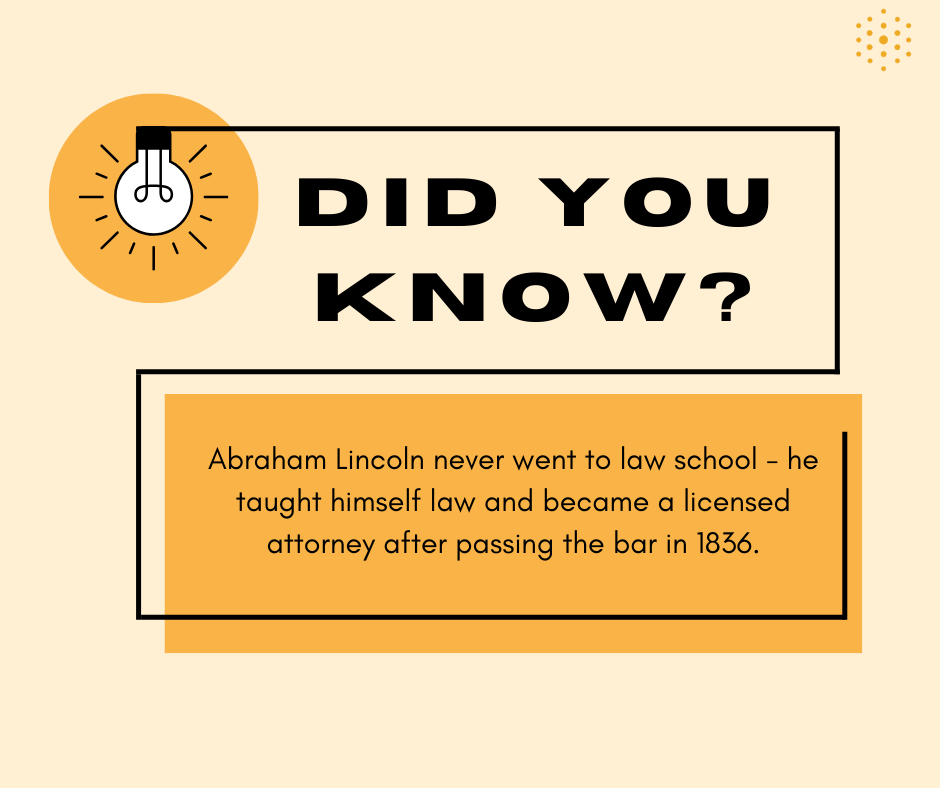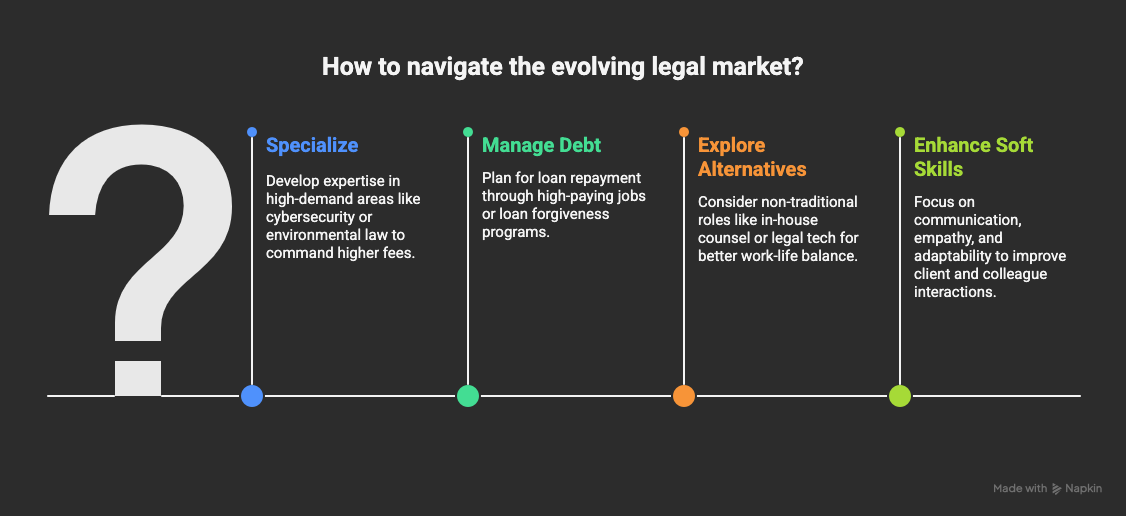What should aspiring lawyers know before starting their legal careers?
The legal field is evolving fast — specialization, adaptability, and financial planning are key. Focus on emerging practice areas like tech law or data privacy, develop strong communication and empathy skills, and explore diverse career paths beyond traditional law firms to build a fulfilling legal career.
So, you're thinking about a career in law? Awesome.
It's a path that can be incredibly rewarding, intellectually stimulating, and financially lucrative.
But let's be honest, the internet is flooded with generic advice that doesn't tell you what you really need to know.
This guide is different. We're going to skip the fluff and give you actionable advice based on what's happening in the legal world right now.
1. The Job Market Isn't What You Think
You've probably heard that the legal market is oversaturated.
And while there are a lot of lawyers out there (over 1.3 million in the US, according to Clio), the demand for legal services is still growing.
The U.S. Bureau of Labor Statistics projects a 4% growth in lawyer employment from 2024 to 2034, which is about as fast as the average for all occupations.
But here's the kicker: the type of legal jobs in demand is shifting.
While traditional law firm jobs are still prevalent, there's a growing need for lawyers in specialized and emerging fields.
This shift is driven by several factors, including rapid technological advancements, new regulations, and evolving client expectations.
Businesses and individuals now require legal expertise in areas that barely existed a decade ago.
This means that while competition for traditional roles might be stiff, there are burgeoning opportunities for those willing to carve out a niche.
Also Read: How to write a resume for aspiring lawyers?
2. Specialize, Specialize, Specialize
Gone are the days when being a "general practitioner" was the norm. In today's legal market, specialization is key.
It allows you to develop deep expertise, command higher fees, and become a go-to expert in your field.
Here are some of the most in-demand legal specialties, according to Headhunter Legal and Clio:
- Cybersecurity and Data Privacy: With data breaches and privacy concerns on the rise, lawyers who can navigate this complex area are in high demand. These lawyers help companies comply with regulations like GDPR and CCPA, respond to data breaches, and manage cybersecurity risks. This also includes advising on privacy-first technologies such as Usercentrics server to server tracking, which supports compliant data collection while reducing exposure to client-side vulnerabilities.
- Environmental Law: As the world grapples with climate change, so too does the need for lawyers who understand environmental regulations. This field involves working on issues like renewable energy projects, sustainability, and compliance with environmental laws.
- Intellectual Property (IP) Law: In our tech-driven world, protecting intellectual property is more important than ever. IP lawyers help inventors, artists, and businesses protect their creations through patents, trademarks, and copyrights.
- Health Law: The healthcare industry is constantly evolving, creating a need for lawyers who can keep up with the changes. This includes navigating complex issues related to healthcare regulations, medical malpractice, and health insurance.
- Technology Law: From AI to blockchain, technology is reshaping our world, and lawyers are needed to help navigate the legal implications. This could involve anything from drafting contracts for software companies to advising on the legal ethics of artificial intelligence.
- Cannabis Law: As more states legalize cannabis for medical and recreational use, a new area of law has emerged. Cannabis lawyers help businesses navigate the complex web of regulations governing the industry.
Also Read: What are some great legal resume examples?

3. Let's Talk About the Debt (Because Someone Has To)
Law school is expensive. There's no sugarcoating it.
The average law school debt for the 2024 graduating class was around $76,300, according to the Law School Admission Council. And that's just the average.
This debt burden can significantly impact your career choices, pushing you towards higher-paying corporate jobs even if your passion lies elsewhere.
Before you take out massive loans, it's crucial to have a plan for how you're going to pay them back.
This might mean working in a high-paying corporate job for a few years, or looking into loan forgiveness programs for public service work.
For example, the Public Service Loan Forgiveness (PSLF) program can forgive the remaining balance on your federal student loans after you've made 120 qualifying monthly payments while working full-time for a qualifying employer.
It's also worth noting that the cost of law school can vary dramatically depending on whether you attend a public or private institution.
According to LawHub.org, the average cost of tuition for a private law school in 2024 was $57,927, while for a public institution, residents paid an average of $31,542.
Also Read: What are the factors that influence a lawyer's salary?
4. There's More to Law Than Big Law
When most people think of a law career, they picture a high-powered attorney at a big corporate law firm.
And while those jobs can be lucrative, they're not the only option.
In fact, there's a whole world of "alternative" legal careers out there that can offer a better work-life balance and a different kind of fulfillment.
According to The Law Society, some of these alternative careers include:
- In-house counsel: Working directly for a company as their in-house legal expert. You'll be involved in the day-to-day legal issues of the business, from drafting contracts to advising on compliance matters.
- Legal consultant: Providing specialized legal advice to clients on a project-by-project basis. This can be a great option for experienced lawyers who want more flexibility and control over their work.
- Government lawyer: Working for a local, state, or federal government agency. This could involve anything from prosecuting criminal cases to working on policy and legislation.
- Non-profit lawyer: Using your legal skills to advocate for a cause you care about. This could mean working for an environmental organization, a human rights group, or a legal aid society.
- Legal tech: Working for a company that develops technology for the legal industry. This is a rapidly growing field with opportunities for lawyers in areas like product development, sales, and marketing.
- Legal Journalism: If you have a passion for writing and the law, you could pursue a career as a legal journalist, reporting on court cases, legal trends, and policy debates.
- Academia: For those who enjoy teaching and research, becoming a law professor is another rewarding path.
Also Read: What is the average salary of an attorney?
5. Your Soft Skills Matter More Than You Think
Yes, you need to be smart and have a good understanding of the law. But in today's legal market, your "soft skills" are just as important.
These are the interpersonal skills that allow you to work effectively with clients, colleagues, and other stakeholders.
According to a study by Morae, some of the most important soft skills for lawyers include:
- Communication: Being able to clearly and concisely explain complex legal concepts to clients and colleagues is paramount. This isn't just about what you say, but how you say it - your tone, body language, and ability to actively listen are all crucial.
- Empathy: Understanding and connecting with your clients on a human level is essential for building trust and providing effective representation. This is especially true in emotionally charged areas like family law or criminal defense.
- Conflict resolution: The ability to help parties find common ground and reach a mutually agreeable solution is a valuable skill for any lawyer, whether you're negotiating a contract or mediating a dispute.
- Adaptability: The legal landscape is constantly changing, so you need to be able to adjust to new situations and think on your feet. This is particularly important for lawyers working in fast-paced fields like technology or corporate law.
- Teamwork: The stereotype of the lone-wolf lawyer is outdated. In reality, law is a collaborative profession. You'll need to work effectively with other lawyers, paralegals, and support staff to achieve the best results for your clients.
- Commercial Awareness: Understanding your clients' business and the industry they operate in is crucial for providing practical and commercially sound legal advice. This goes beyond knowing the law; it's about understanding how legal issues impact the bottom line.

Final Thoughts
A career in law can be rewarding, but it’s also evolving - demand is shifting, specialization is essential, and success depends on more than just academics.
From managing law school debt to exploring alternatives beyond Big Law, the path forward requires strategy, awareness, and adaptability.
If you’re preparing for this journey, the right guidance and resources can make a world of a difference.
Hiration can provide tailored support with resumes, interviews, LinkedIn profiles and more - to help you stand out in a competitive market.
A thoughtful approach today can shape a meaningful career tomorrow.
Law Career Guide — FAQ
Is law still a good career choice?
Yes. Despite competition, demand for legal services is growing, especially in emerging fields like data privacy, technology law, and environmental compliance. The BLS projects 4% growth for lawyers through 2034.
Which areas of law are most in demand?
Cybersecurity, environmental law, intellectual property, and healthcare law are among the fastest-growing specialties. Lawyers in these fields often command premium salaries due to high complexity and demand.
How can I manage law school debt effectively?
Plan early. Consider federal loan forgiveness programs like PSLF, choose public schools when possible, and explore high-earning roles initially to pay off loans faster before transitioning into passion-driven areas.
Do I need to work in a big law firm to succeed?
No. Many fulfilling paths exist beyond Big Law — including in-house counsel, government, non-profits, academia, and legal tech. These alternatives often provide better work-life balance and diverse challenges.
What soft skills are essential for lawyers today?
Communication, empathy, adaptability, teamwork, and commercial awareness are vital. These skills help lawyers build trust, navigate complex negotiations, and align legal strategy with business or client goals.
What are some alternative careers for law graduates?
Options include legal consulting, policy analysis, legal journalism, compliance roles, and working in legal tech startups. These paths leverage legal expertise while offering flexibility and diverse career growth.
How can I choose the right legal specialization?
Start by aligning your interests with market demand. Explore internships or externships across various fields like IP, corporate, or health law to identify where your skills and passion best intersect.
What’s the best way to build a strong professional network in law?
Join bar associations, attend industry conferences, and connect with mentors early. Engage on platforms like LinkedIn by sharing insights, writing about legal trends, and participating in relevant discussions.



